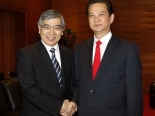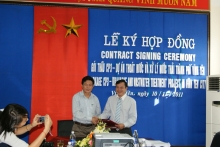
PM: VN pledges to effectively use ADB loans
VietNamNet Bridge - Vietnam pledged to effectively use loans from the Asian Development Bank (ADB), Prime Minister Nguyen Tan Dung said in Hanoi on May 5.
PM Dung made the commitment while receiving ADB President Haruhiko Kuroda, who was in Vietnam to attend the 44th Annual Meeting of the Board of Governors of ADB.
PM Dung said that Vietnam received effective assistance from ADB during its development process and expressed his hope of receiving further help from the bank to expand cooperation.
He asked ADB to coordinate with relevant Vietnamese agencies to ease hindrances and disburse ADB projects, especially ones investing in transport infrastructure and poverty reduction.
PM Dung described the ADB annual meeting as a major event for both ADB and Vietnam , with a belief that the event would successfully contribute to boosting cooperation between Vietnam and ADB.
He informed the guest that during the past three months Vietnam had been focusing on implementing measures to control inflation, stabilise the macro-economy and ensure social welfare, while maintaining sustainable development of the economy.
As a result, initial positive signals on exchange rate management, gold trading and trade deficit reduction have been seen.
However, Vietnam still faces many difficulties and must attempt to control inflation more strictly.
Haruhiko Kuroda praised Vietnam’s assistance in organising the ADB meeting, affirming that ADB would increase preferential loans to Vietnam, especially to help the country carry out projects in environment, transport infrastructure and poverty reduction.
After the reception, PM Dung witnessed the signing of an agreement where ADB will give a loan of 1.38 billion USD to Vietnam, to enhance nationwide clean water access, conserve threatened forests, and ease urban gridlock.
ADB urged to invest more in agriculture
The Asian Development Bank (ADB) should provide more financial resources and investments for the agricultural sector in Asian countries in order to strengthen food security and prevent inflation due to high food prices.
The idea was contributed by members of ADB’s Board of Governors and representatives from large countries at the first plenary session of the 44th annual ADB meeting in Hanoi on May 5.
According to an Indian representative, the current rising inflation trend in the region is causing adverse impacts on poor people in each nation and the whole region as well. Therefore, together with priorities given to disaster mitigation, ADB should increase investment in the agricultural sector and strengthen connectivity through public-private partnership (PPP) for agricultural development.
In addition, ADB needs to boost soft links to speed up cooperation and information sharing in addressing issues such as epidemics and natural disasters in the region.
The Indian representative suggested ADB promptly discover an effective mechanism to connect the Asian region with Africa and strengthen the South-South cooperation, as well as call upon its member countries to contribute more to ADB’s fund, in order to increase resources for development and for addressing regional challenges.
Sharing this point of view, Marisa Lago, Assistant Secretary for International Affairs and Treasury Department of the US, warned that high inflation accompanied by high food and fuel prices are threatening the recovery of Asia, while poor people are yet to get appropriate assistance in food and energy to cope with the shock.
Therefore, to reach sustainable development, developed countries in Asia should share trade surpluses with developing ones, she said.
The US wants ADB to maintain stable loans for underdeveloped countries, which need ADB resources to develop their economies and narrow the development gap with the developed, she said.
While emphasising the importance of pouring more into the ADB fund, Lago said the US will cooperate with ADB and other financial organisations to maximise this source of capital.
A German representative stated that agricultural development should be relocated onto ADB’s investment focus to ensure regional food security and effectively fight inflation and high food prices.
Pointing out challenges facing the region, a representative from the Republic of Korea suggested establishment of an Asian vision committee led by ADB, to strengthen connectivity among member countries, share information and effectively settle challenges in general inequality and development gaps.
The recovery and growth of Asia are a result of economic restructuring, he said, adding that to reach the goal of sustainable and balanced growth, ADB should have more flexible policies that create more conditions to increase capital sources for poor countries in the region.
The participants suggested ADB focus more investment on regional export and infrastructure, with its continued support for Asian countries to develop markets and connect supply networks.
ADB needs to continue making reforms on administration and strengthen cooperation with the World Bank (WB), the International Monetary Fund (IMF) and G8 countries to intensify its power.
Earlier, ADB President Kuroda and RoK Minister of Strategy and Finance Jeung-Hyun Yoon signed an agreement to extend and expand RoK support for ADB projects in Asia-Pacific in the fields of renewable energy, water, sustainable transport, education, finance and administration.
Vietnam, ADB sign $1.38 billion loan deal
Vietnam’s central bank and Asian Development Bank have reached a $1.38 billion lending deal to enhance nationwide clean water access, conserve threatened forests, and ease urban gridlock.
The loan agreement has been signed by State Bank of Vietnam Governor Nguyen Van Giau and Asian Development Bank (ADB) President Haruhiko Kuroda in Hanoi. Vietnam Prime Minister Nguyen Tan Dung witnessed the signing ceremony.
“ADB’s assistance will help ensure that more people in Vietnam have access to clean water, more livable cities, and biologically diverse forests that will be preserved for future generations,” said Kuroda.
In many of Vietnam’s largest cities, 30 percent to 40 percent of treated water is lost before it reaches the end user. Moreover, four in every ten families have no connection to a central water supply system.
A $1 billion financial support facility from ADB will help improve clean water access for 3 million families in Vietnam’s cities, including half a million poor households who will receive their own piped water connection for the first time. The assistance is part of a larger $2.8 billion investment program.
With Vietnam’s forests coming under increasing pressure from rapid economic development and climate change, habitat restoration is needed not only to protect the country’s environmental treasures, but also to safeguard the livelihoods of indigenous communities.
A $30 million loan from ADB’s concessional Asian Development Fund will enhance cross-border cooperation in protecting a contiguous stretch of biodiversity-rich forest in Vietnam’s Central Annamites, which spans the highlands of Quang Tri, Thua Thien-Hue and Quang Nam Provinces
This is part of a larger program that is also supporting the preservation of key forestlands in Cambodia and Lao People’s Democratic Republic.
The assistance package for Vietnam includes approximately $8 million to improve clean water and sanitation services and upgrade market roads in the 34 largely ethnic minority communes in the project area.
“Sustainable economic development and environmental preservation are intertwined,” said Mr. Kuroda. “In the long term, coupling conservation and livelihood improvements will help ensure that Vietnam’s forests and their biodiversity are managed well.”
The third component of the assistance is a $350 million loan, which is the first tranche of an overall $636 million ADB package. This package is supporting a $1.6 billion project to construct a modern expressway to the south of congested Ho Chi Minh City.
With the city’s population expected to swell by more than 50 percent by 2025, new roads are needed to complement other modes of transportation, including an ADB-supported metro rail system, to ensure the efficient transportation of goods and people.
The 57-kilometer expressway between Ben Luc and Long Thanh will reduce traffic in the heart of Ho Chi Minh City by allowing vehicles traveling from east to west to bypass the city center.
When the full expressway opens in 2017, it will reduce east-west travel time by 80 percent and cut the number of traffic accidents by 10 percent.
Source: VNA/Tuoi Tre






